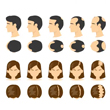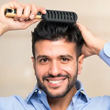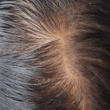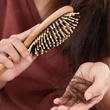Does an Oily Scalp Cause Hair Loss?
Hair loss is a fairly common issue nowadays. Pollution, stress, chemicals, unhealthy lifestyle can all indirectly lead to hair loss. Another lesser-known culprit of hair loss can be an overly oily scalp.
An abnormally oily scalp attracts more dirt leading to dandruff, itching, and other scalp issues. But before we venture into the solution of an oily scalp, let us understand the major causes behind it.
What Causes an Oily Scalp?
Seborrheic Dermatitis 1,2

Like the rest of our body, the outer layer of our scalp contains an oil-producing gland called the sebaceous gland. The oil (or the sebum) produced through these glands lubricate and moisturize our skin and hair.
While sebum production is necessary for hydrating the hair, excess production can be harmful. Seborrheic dermatitis is a fungal condition that causes excess sebum production by the sebaceous gland. It is often accompanied by itching, irritation, and red patches on the skin.
It is a common skin condition and has been associated with hair loss.
Hormonal Imbalance 3
Oily scalps can also be associated with hormonal imbalance. Stress, medications, birth control pills are some of the things that affect hormone levels, which in turn affect the oiliness of your hair.
Pollution 4

Continuous exposure to pollution has a damaging effect on your scalp. Pollution causes faster exfoliation of the outer layer of the scalp exposing the sensitive inner layers. Prolonged exposure of the sensitive layer to pollution can lead to dandruff, irritation, oily scalp, and thinning of hair.
Food Habits and Scalp Hygiene

An unhealthy diet and lack of personal hygiene are the underrated causes of many scalp issues. Your hair needs its dose of nutrition which excessive oily, spicy, and junk foods cannot provide. Similarly, lack of personal hygiene, dirty pillow covers or bed sheets, unwashed hair tools can all lead to greasy hair.
Can Oily Scalp Cause Hair Loss? 5,6
Several observations have found that conditions like seborrheic dermatitis and dandruff resulting from poor scalp health are closely associated with hair loss. Excessive oil production can cause inflammation of the scalp along with irritation and itchiness. Repeated and aggressive scratching of the scalp can damage the hair follicle resulting in hair fall.
Besides, increased oil production can also cause the Malassezia yeast to grow. Malassezia is a type of yeast naturally found on the skin of human beings. Excess Malassezia, if left untreated, can further exacerbate scalp issues and compromise hair quality and growth.
How to Treat Oily Scalp at Home?
Maintaining Hair Hygiene

The first step one should take towards healthy hair is maintaining proper hair hygiene. Wash your hair regularly to prevent excess oil build-up on the scalp. Take time to gently massage your scalp and rinse well so that no product is left behind.
Not just your scalp but other hair tools should also be regularly cleaned. Avoid applying conditioner to your scalp. If you have to use some conditioner, then restrict it to the tips of your tresses.
Aloe Vera for Seborrheic Dermatitis 7

Aloe vera is one of the best natural solutions for oily hair. Research has found it to be beneficial in the treatment of conditions such as seborrheic dermatitis. Its usefulness may be derived from its anti-inflammatory properties preventing skin flare-ups.
Use a few tablespoons of aloe vera gel to gently massage your hair. Try this twice a week for a few weeks and see the result.
Lemongrass Essential Oil for Dandruff 8

Dandruff build-ups are common in oily scalps, and getting rid of them becomes essential for healthy hair. Lemongrass essential oil can prove to be an effective cleanser for dandruff, soothing your itchy scalp.
A 2015 study concluded that the application of hair tonic containing essential oil twice a day significantly reduced dandruff after just one week.
Add 2-3 drops of lemongrass essential oil to your regular hair or shampoo and massage daily for best results.
Probiotics 9
Probiotics are not only good for your body but your scalp as well. A study conducted with 66 volunteers who had moderate dandruff concluded that daily intake of probiotic supplements significantly decreased dandruff flare-ups and scalp greasiness.
However, still more evidence is required to gauge the degree of effectiveness of probiotics in treating an oily scalp.
Conclusion
A little oil is essential for healthy hair, but excess secretion can be a problem. Try the above natural methods to balance out the oil production in your scalp.
However, for chronic conditions or severe symptoms, you should seek medical advice from a dermatologist.
Myth Busters HairFall

Androgenetic Alopecia - Everything You Need To Know
Have you been experiencing excessive hair fall over a prolonged period of time? It could be an early sign of androgenetic alopecia. It is a hair loss disorder common in both genders and can lead to progressive thinning and even baldness in some patients if not caught and treated early.

How To Make Hair Grow Faster For Men
A head full of healthy hair is a matter of confidence. Hair has its own mechanism of growing and shedding, and it is when this mechanism is thrown off that growth is hindered. Especially in the case of males, hair growth faces a lot of hiccups that can easily be managed.

Female Pattern Baldness - Causes & Treatments
Have you suddenly noticed an increase in the number of hair strands on your pillow in the morning? Or is your ponytail getting thinner by day? Well, you might be suffering from female pattern baldness. While that does sound scary, identifying it early on is key to treating this condition effectively. So keep reading to know what this is, how you can identify it, and most importantly, what treatments you can avail of to get your beautiful lustrous hair back.

What Are The Reasons For Hairfall?
Almost everyone experiences some amount of hair thinning over the years. Shedding around 50 to 100 single strands of hair per day is considered normal. However, losing more than 150 strands a day, experiencing sudden thinning, or developing circular bald patches on your scalp are reasons for concern. Hair loss occurs when new hair doesn’t grow fast enough to replace the amount of hair you lose daily. Hair can fall due to various reasons, with hereditary hair loss and poor nutrition being the most common hair fall reasons.

Expert Approved Tips For Hair Growth
What can be more debilitating than seeing hundreds of hair strands shedding from your scalp every time you brush your hair? Also, excessive molting occurs during seasonal changes that can be very stressful for you. Although it’s okay to lose between 50-100 strands every day, according to the American Academy of Dermatology, the problem occurs when you start shedding more than normal. But that doesn’t mean you have to feel helpless as there are ways to grow your hair back. Even if you are coping with baldness or alopecia, certain hair growth tips from dermatologists can come to your rescue. Read on to discover how these tips can be your savior when abnormal hair fall problems are in sight.
Trending Videos
+ 9 Sources
'LMRC - GGI-CO-A2-DMA-300001252-300001252-WM-L21-704'
© 2021 Dr. Reddy’s Laboratories Ltd. All rights reserved.